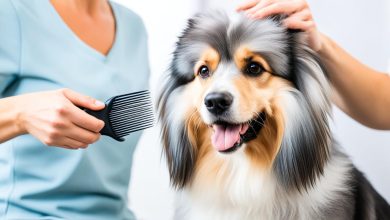Senior Pet Care Tips for Your Aging Companion

As pets get older, they need more care to stay healthy and happy. Whether you have an older cat or dog, there are important tips to follow. Experts and vets have given us great advice on caring for senior pets.
Recognizing the Signs of Aging in Pets
Noticing when your pet starts getting old is crucial. They might play less, eat differently, lose or gain weight, have trouble moving, change their behavior, or dislike the cold or heat. If you see these changes, talk to your vet. They can check your pet and give advice suited to its needs.
Essential Senior Pet Care Tips
To help your older pet live a happy life, here are some key care tips:
- Give them food that’s right for their age to meet their nutritional needs.
- Exercise regularly to keep their muscles strong and manage their weight.
- Go to the vet often to keep an eye on their health and spot any problems early.
- Make their living area comfy and safe, so they can easily reach their bed, bathroom, or food and water.
- Ask your vet about supplements or medicines that could help with specific health issues.
Key Takeaways:
- Look out for signs your pet is aging, like changes in activity, eating, and mood.
- Talk to your vet for advice tailored to your senior pet.
- Ensure they get the right diet and enough exercise.
- Create a safe and cozy space for them.
- Consider vet-recommended supplements or medicines.
Recognizing the Signs of Aging in Pets
As pets grow older, watching for aging signs is key. They go through physical and behavioral changes, just like people do. Spotting these early helps us keep our furry friends healthy and happy longer.
Physical Signs of Aging
Older pets often move less and prefer rest over play. They may also show less interest in food. These changes are common and signal they’re getting older.
Pets might gain or lose weight as they age, which points to a slower metabolism. Talk to a vet if you see weight changes without diet or exercise changes. It’s especially important if they’re losing weight fast, as this could mean health issues.
Having trouble getting up or moving can signal aging too. Things like arthritis or muscle loss might be why. If moving seems hard for them, a vet visit could help.
Behavioral and Emotional Signs of Aging
Your pet’s mood may change with age. They might want to be alone more or get upset more easily. Or, they may stick by you more and seem anxious or confused at times.
“As pets get older, understanding and patience are crucial,” shares Dr. Jane Thompson, a seasoned vet. “A steady routine and more comfort from us can help them feel safe.”
Temperature Sensitivity
Older pets can be more sensitive to temperature changes. Extreme heat or cold is harder on them. Making sure they’re comfortable and safe from harsh temperatures is important.
Every pet ages differently, so what’s true for one may not be for another. Watching for signs and speaking to a vet when something’s up is key. They can guide you in giving your pet a happy, healthy older age.
Essential Senior Pet Care Tips
As our furry friends grow older, they need extra care. It’s key to adjust their routine to support their aging. Here’s how to help your senior pet live happily and healthily.
First, a balanced diet is vital. Talk with your vet to find the right food for your old pet. They need quality food that helps their joints and digestion. Adding joint supplements and omega-3s can ease arthritis symptoms.
Even as pets age, keeping them moving is important. Their energy might be lower, but they still need exercise. Try shorter walks or gentle swims. Always watch for signs they’re tired, and check with your vet if you’re unsure.
Regular vet visits are a must for older pets. They can get sick more easily as they age. Going to the vet twice a year can catch any problems early. Your vet might suggest dental care to keep their gums healthy.
FAQ
What are the signs of aging in pets?
When should I consult with a veterinarian for my senior pet?
How can I keep my senior pet healthy and comfortable?
Are there any specific medications or supplements for senior pets?
Should I make any modifications to my home for my senior pet?
Source Links
- https://www.humanesociety.org/resources/caring-older-pets
- https://bettervet.com/resources/pet-health-care/senior-dog-care
- https://anticruelty.org/pet-library/golden-years-caring-your-senior-companion




